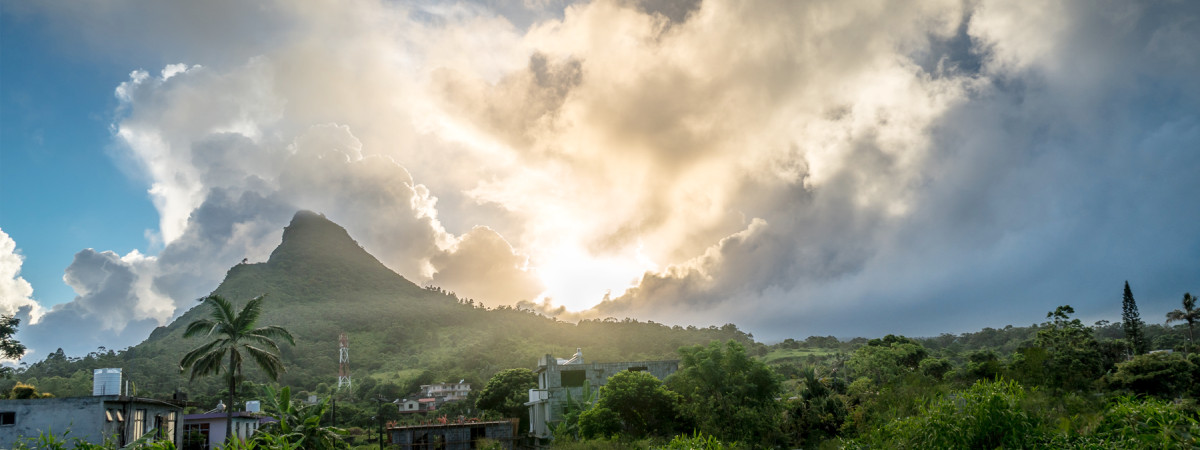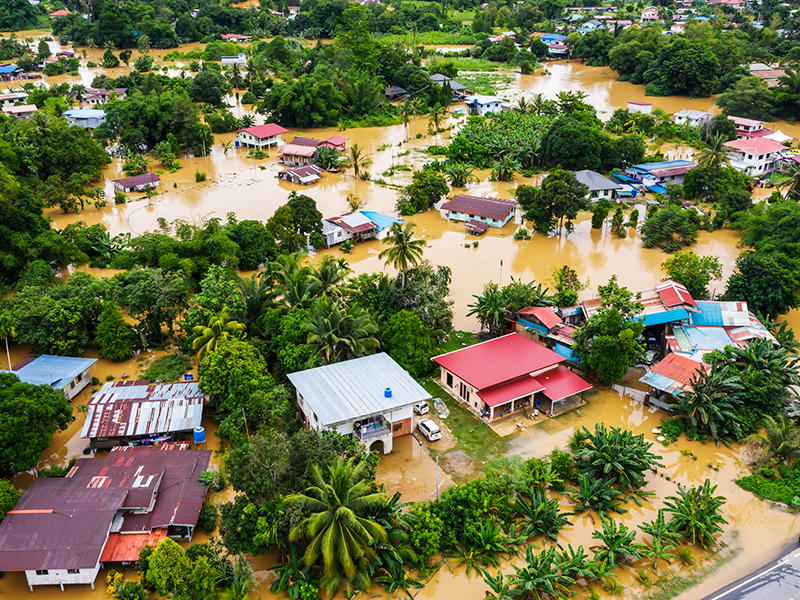
Photo by Daniel_Malinowski on iStock
Authors
-
Melissa Do
Former Manager, Climate Change, BSR
-
Anine Bundgård
Former Associate Director, Climate and Nature, BSR
-

Director, Climate and Nature, BSR
-
Jacob Wiman
Former , BSR
Climate justice acknowledges that climate change has disproportionate impacts on communities and exacerbates underlying existing systemic inequities. While climate injustices exist worldwide, they often are more acute in less economically developed countries.
While the term may be new, businesses are starting to proactively advance climate justice efforts. Business action includes building community resilience to physical climate impacts such as severe flooding or wildfires; ensuring workers, suppliers, and communities have access to affordable low-carbon, climate-resilient products and services; safeguarding human rights in the clean energy value chain as economies transition to net zero; and enabling a just transition for workers and communities that have been dependent on fossil fuel development for decades.
In India and the Philippines, climate injustices disproportionately impact women and children, and major issues can range from extreme weather and flooding to land rights and land conflicts to lack of access and opportunities in the “green” transition. In addition, India and the Philippines are coastal countries with significant levels of income disparity and inequality. Businesses in these two countries are addressing climate justice via resilience building, community education initiatives, and climate adaptation.
The following are noteworthy climate justice interventions by businesses that include efforts to improve access to healthcare in remote communities at risk from climate change, reskill workers in the energy transition toward a net-zero future, and build resilience among local communities to adapt to climate risk.
1) Improving access to healthcare in remote communities at risk from climate change
In the pursuit of a climate-resilient future, it is vital that vulnerable communities have equitable access to products and services. To address this, Metro Pacific Investment Corporation (MPIC), an investment management and holding company, improved critical access to healthcare for under-served and remote communities. As the Philippines continues to confront increased climate impacts from more frequent and extreme weather events, this digital health access can prove crucial as an increasing number of remote communities face additional barriers to reaching health professionals.
Climate change is threatening Filipinos health and wellbeing, and rural areas face a shortage of healthcare services. MPIC developed a digital healthcare application called "mWell." In remote, mountainous regions and numerous low-lying coastal areas, many Filipinos are exposed to rising temperatures and more extreme weather events. The app provides a platform for patients to consult virtually with doctors, specialists, and mind health experts; receive e-presecriptions and medicine deliver; and more. It is used regularly, and among the users are those in remote areas, including indigenous people who are typically required to travel for one day to reach hospitals.
The application partnered with a multi-channel payment platform, to provide a more accessible payment option for those without credit or debit cards. MPIC also deployed mWell OnTheGo, a portable mobile digital clinic for remote communities that includes foldable solar panels, a power station, pocket Wi-Fi, and a preloaded tablet or mobile phone that enables patients living in areas without electricity to access medical support.
2) Reskilling workers in the energy transition toward a net-zero future
A just transition to a net-zero economy aims to ensure that workers in industries that have been heavily dependent on fossil fuels have access to reskilling, upskilling, and other green jobs as economies transition to clean energy. As businesses create and execute their climate transition plans, it is imperative to provide support for historically underrepresented groups, like women, youth, and other marginalized communities.
To support workers in the Indian green jobs movement, Mahindra Susten, the clean-tech subsidiary of the Mahindra Group, narrowed in on knowledge and skills development as a foundational component to ensure rural and economically disadvantaged communities can participate more fairly in India’s growing green economy.
Recognizing a knowledge and skills gap in the installation and maintenance of solar power plants among the workforce, Mahindra Susten established the "Centre of Excellence" skilling initiative in 2016. As renewable power installations continue to rapidly expand in India, which has historically relied heavily on domestically produced coal to power its growth and modernization, reskilling, and upskilling energy sector workers, especially those with limited access to educational and economic opportunities, is essential to support a just energy transition. Located in Karjat, Maharashtra, the Centre for Excellence equips workers in remote and socio-economically disadvantaged communities with the skills necessary for employment in the renewable energy sector through physical training sessions with practical assignments, case studies, and lectures. The skilling program is open to anyone, but specifically targets candidates from rural and economically disadvantaged areas, particularly women and youth in these communities who are underrepresented at the Skilling Centre.
The Centre benefits from contributions by various teams, leveraging their understanding of the local context, external expertise on required skills and training, and circular feedback loops for program development and improvement. Program graduates have support to find employment opportunities. To date, the Skilling Centre has trained over 10,000 individuals in semi-trade skills and 4,500 technicians in full-trade skills.
3) Building resilience among local communities to adapt to climate risk
The physical impacts of climate change, such as floods, heatwaves, and droughts, disproportionately affect communities that have limited resources to prepare and rebound. The lack of proper infrastructure and financing for disaster preparedness and response expose communities to higher climate risk. Farming communities and the agriculture supply chain are particularly vulnerable to physical climate impacts as both are heavily reliant on favorable weather conditions and climate for quality crop yields; this ties their livelihoods closely to external factors often outside of their control.
To support rural farming communities in India, ITC Limited’s Agri Business division, India’s second largest exporter of agri-products, supports local communities in building resilience to the increasing severity and frequency of droughts and flash floods. Improved watershed management practices have led to the improved quality and quantity of crops, which allow local farmers to have more stable and resilient livelihoods.
ITC Limited’s Agri Business Division, established the Watershed Development Programme to promote equitable water access for rural farming communities. Small-scale farmers in India, dependent on rainfall from monsoons, are facing unstable weather conditions, poor soil, inadequate infrastructure, and water scarcity, making them disproportionately affected by climate change impacts. The Programme improves farmers’ access to water resources for irrigation and enhances soil fertility, mitigating the impact of volatile weather conditions on farmers and allowing farmers to cultivate more than one crop per year with better quantity and quality, leading to higher incomes and improved livelihoods.
ITC, in partnership with non-governmental organizations, create Water User Groups in farming communities that prioritize the inclusion of disadvantaged community members such as poor farmers and women. These Groups facilitate equitable benefit and resource distribution; share improved agricultural practices; and are trained on watershed management techniques, financing, and decision-making. ITC collaborates with farming communities and communities near ITC’s factories on program development and implementation. Mandatory financial contributions from the community based on economic status ensure community ownership and long-term Programme benefits.
In the Pune and Chhindwara districts in Maharashtra, groundwater replenishment efforts as part of the Watershed Programme led to increased vegetation, soil organic carbon levels, and productivity of major crops. The Programme, spanning 45 districts in 16 states in India, has created water harvesting structures, improving soil health in 1.39 million acres of farmland, and created 3,900 Water User Groups in local communities, benefitting 409,000 households.
The examples explored three key areas in which companies can advance climate justice. Businesses can begin to act on climate justice by ensuring human rights, equity, inclusion, and justice are integrated into climate strategies and transition plans. Businesses need to work closely with communities to identify the communities’ needs and collaboratively determine interventions that address climate injustices. Sharing examples of business action is essential for collective learning and to scale efforts to advance climate justice.
BSR’s latest sustainability insights and events straight to your inbox.
Topics
Let’s talk about how BSR can help you to transform your business and achieve your sustainability goals.







